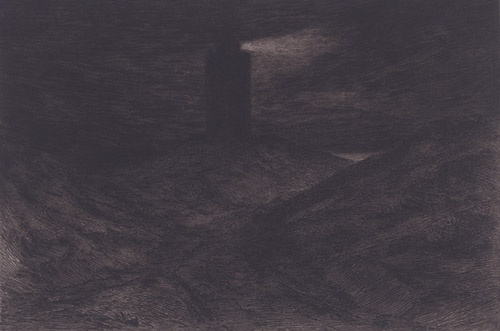 Carel Nicolaas Storm van 's Gravesande, Vuurtoren van Katwijk, courtesy of the Rijksmuseum
Carel Nicolaas Storm van 's Gravesande, Vuurtoren van Katwijk, courtesy of the Rijksmuseum
Spitting in the Ocean to Desalinate it Won’t Make it a Spring
Translated by Katia Grubisic.
Since the lighthouses had been put in around the island of Ys, accidents had decreased dramatically. There was no denying that the lights were a good thing. But the nine lighthouses, though their lanterns blazed away, barely made a dent in the number of wrecks. The deadliest rock, Locqnoir, and the reef that led out to it, still wreaked havoc.
“To truly bring about the end of shipwrecks, we would have to light that outpost of evil, to go out to that remote rock and build there, on a reef that half the time is under water, storm-swept even when the sun is shining on the island,” the critics mocked. Those who were against putting lights thought that what they were calling for was absurd. “Let’s do it,” the First Men’s League said, “let’s build a tenth lighthouse.” It was to be the highest, the strongest, the greatest. Locqnoir was a smooth outcropping, slightly rounded, like the back of a whale. It seemed to have been polished by a millennia-long caress, carved by nature so that humans wouldn’t be able to resist the idea of settling there. But its welcome was an illusion: Locqnoir would prove as inhospitable to builders as it was threatening to sailors.
Work began in the summer of the year twenty-six before the Massacre of the First Men. The workers disembarked on Locqnoir when the tide went out, and left when it came in. On the second day, one of the men slipped on the spray and guano and broke his leg. First, the foundation had to be excavated. The men would dig and dig, then walk away dejectedly as they watched the waves fill in four hours of work. When the weather was bad, the rock was completely off limits. For days they waited in a ship anchored on the northwest of the reef, squalls and mist blowing over like clouds through a mountain pass.
The tragedies began on the first day of August. One of the rowboats used to carry equipment was lost in a gale, along with its eight occupants. The following year, they had started ferrying one-tonne granite blocks across on skiffs in the merciless swells, and one of the workers was crushed during the hoist, his upper body mangled to a pulp. In September of the third year, a storm on the equinox tide wiped everything out. When the men were able to set foot on the rock again, most of the granite blocks had disappeared, as if a giant had come along and stolen them. They had to start from scratch. And the engineers had to redo their numbers, try to adjust for the power of the sea.
Every year, a handful of workers died on Locqnoir: either they lost their footing, or were in the wrong place when a breaker went rogue, even though they used a crier, whose only task was to watch the waves and warn the workers of surges. But the worst disaster happened during the twelfth year. A squall came up unexpectedly, the water churning as if in a cauldron. The boats moored on the rocks were swept away. The twenty-three masons, nine luggers and three carpenters had no place to run or hide, and so they drowned, caught by the tide.
Word started going around that building the lighthouse had caused more deaths than the reef itself, though the harbour pilots denied any such thing. No one wanted to go out to the cursed rock. They started resorting to foreign labour, or criminals, promising them that their exile would be commuted in exchange for their services. After twenty years of work, the tower was still nowhere near done. Half the time was spent rebuilding the previous year’s work, and the other half waiting for kinder skies. Even those who had defended the project from the start breathed a sigh of relief when, in April of the sixth year before our time, the Admiralty announced the end of the Locqnoir debacle. Everyone agreed with the obvious: building a lighthouse on that rock was impossible. Everyone, that is, except those who came to be known as the oppositionals, dream-guzzlers, crusaders of the light—the harbour pilots, guardians of the First Men’s League. ⁂
Dominique Scali’s debut novel was a 2015 Governor General’s Award finalist for French-language fiction. Her second book, Les marins ne savent pas nager, won a number of prizes, including the Prix des libraires du Québec, and will appear in English translation from Talonbooks.
Translation note: Translated from Les marins ne savent pas nager (2022) published by La Peuplade. Talonbooks holds the English-language rights, and the English translation of the novel is forthcoming. Reprinted with permission from the publisher





